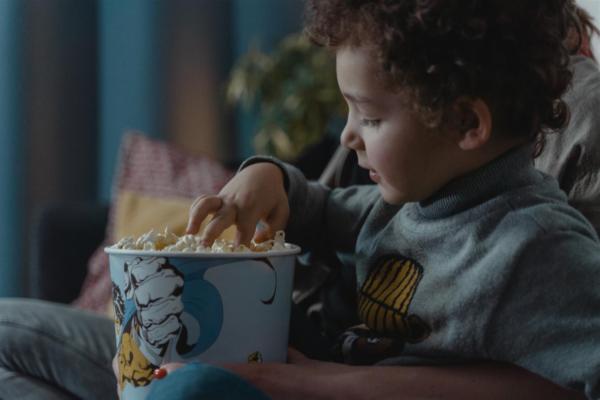Do you have a favourite food to eat at Christmas?
Perhaps it isn't Christmas dinner itself that you love, but all the extras - cheese, mulled wine, nibbles, delicious puddings - that appear around this time of year that make you feel ‘Christmassy’.
There’s no doubt that for many people, food is a huge (and brilliant) part of Christmas. Add some well-lit magazine photography, soft focus television adverts with slow-motion shots of mouth-watering food alongside images of families having fun around a festive table, and the idea of a ‘picture-perfect’ Christmas full of food is cemented in our minds.
In my home on Christmas Day, breakfast for one of my children will be shreddies, milk and honey – just like every other day of the year. This precious child of mine will have a sandwich lunch at 12.30 on the dot, either from his lunchbox or on his plate. He may sit at the table, but he may also choose a bean bag or wobbly seat to ground himself as he eats.
While most of the family sit down for ‘Christmas dinner’ my lovely boy will probably pop in to the dining room to get a fizzy drink or to be connected to people who he feels safe with, but he might pull his t-shirt over his nose as he enters because the smells are strong and unfamiliar.
For tea, he’ll have fish fingers and pringles at the usual time. This familiarity will help keep him regulated on a day when so many things are different to a normal day.
For many of us, food, and our enjoyment and experience of it, is something we take for granted, particularly at this time of year. For many families who have the privilege of having care-experienced children with them at Christmas, there will be plans and adjustments made to ensure needs are met.
Here are four things that might mean food at Christmas has to look a little different for some families.
Sensory overload
Trauma can affect how the brain interprets the sensory messages that it receives from the body. This means that a subtle smell to you or me can feel overpowering for a care-experienced child. Mild tastes can seem intolerable, particularly if there are other things that are making them feel dysregulated or anxious.
Consider a ‘normal’ festive gathering: it’s an exciting day, which means emotions are even harder than normal to regulate, and there’s a table with lots of different foods that aren’t eaten at any other time of the year. The grownups might want you to sit still and ‘enjoy’ being at the table together, possibly in another family member’s home, at a bigger or fancier table or in a chair you don’t usually sit in. Other adults are encouraging you to wear a scratchy, noisy paper hat on your head, and there’s the real possibility of crackers popping loudly around you in a room that will probably already be noisy.
Looking at our ‘normal’ Christmas traditions through the lens of a child or young person who has had a tricky start, perhaps it’s easier to understand why some may react in ways that surprise us as they try to communicate that things are becoming too overwhelming.
All change!
For children who have experienced trauma, one of the things that can increase their sense of felt safety is routine. At Christmas, everything changes. We eat at different times as days are more relaxed and everyone’s home from school, we eat in different homes as many of us visit friends and family and we can stray from the meals and snacks we’re used to as we indulge in some seasonal treats and big meals with loved ones.
So much change can cause anxiety and dysregulation for children who have experienced trauma.
Expectations
Have you ever worried about what other people’s expectations might be of your table manners, or where you’ll have to sit to eat at someone else’s house? Have you ever felt concerned that no one else will know how to cook the food you like in the way that you like, or if you’ll be ‘made’ to eat everything on your plate?
Many of us won’t have given too much thought to these things, or will be confident to express our preferences with others, secure in the relationship that we have with them.
For many care-experienced children and young people, the added uncertainty can increase their anxiety. They might not be conscious of it or able to articulate how they feel, but it can manifest in their behaviour and reactions.
Experience
Sadly, some children will have grown up without the certainty of regular meals and so their relationship with food is disordered. If you’re not sure when, or even if, your next meal is coming, you may be inclined to take as much food as you can when it’s offered or visible.
Often at Christmas time, there is just more food around; bowls of crisps out for guests, little chocolates behind advent calendar doors, party buffets. It can feel scary and overwhelming, and some children can feel the need to take as much food as possible and hide it away. It isn’t them being greedy, but part of how their experience of trauma impacts their feelings and their behaviours.
Some families may choose not to have additional sweets or treat food in the house, or they may appear to be rationing them in a way that may not seem very ‘festive’ to you (I was once told I was a ‘Scrooge’ for having certain things in a locked cupboard!). But it may just be what needs to be done to help support their children in their relationship with food at Christmas.
So, if you’re alongside families who are raising care-experienced children, what can you do this Christmas?
ASK
When we ask people what we can do, we’re showing them that we care and that we understand that things might be different for them and their children. There’s no one size fits all answer, and asking about the individual shows that you value them and those raising them.
Try asking if there’s anything food-related you could do that might help their child enjoy being in your home. You could ask if they have a favourite food or if they’d like to bring something, or whether their child will sit at the table with you or if somewhere else would work better.
When we invite the adults who know the children in their care to share their wisdom and experience, it puts everyone in a better position to make Christmas mealtimes easier and more enjoyable for all!
Adapt expectations
I remember the first time that one of my children took their plate of food away from the table at someone else’s house, made a little den with a blanket at the end of a sofa and ate their lunch in there. I’ll never forget the kindness of our friends who told us that it didn’t matter to them where he ate, as long as he knew his presence was wanted.
One family we know who foster declared last year’s Christmas dinner to be ‘Favourite lunch’ and everyone got to pick their own meal. Nothing matched, it was slightly chaotic and the table had everything; from beans on toast to curried goat, roast turkey to macaroni cheese. It was their favourite meal they’d ever had, purely because of how little pressure they felt to get it ‘right’.
Send treats!
If you know families who are fostering or have adopted, their children may not enjoy treat food or be able to have additional sweet things at this time of year. But that doesn’t mean the adults don’t enjoy them! In all the busyness of the season, perhaps sending a little treat for the grown-ups shows them that they’re seen and valued (and they might even share it with you!).
Our Christmas dinner table is pretty far from those picture-perfect magazine covers; but it’s ours, and we love it.
----------------------------------------------
As you prepare for Christmas, we invite you to consider donating to Home for Good to help us find a home for every child who needs one. Learn more about our Christmas appeal here.











